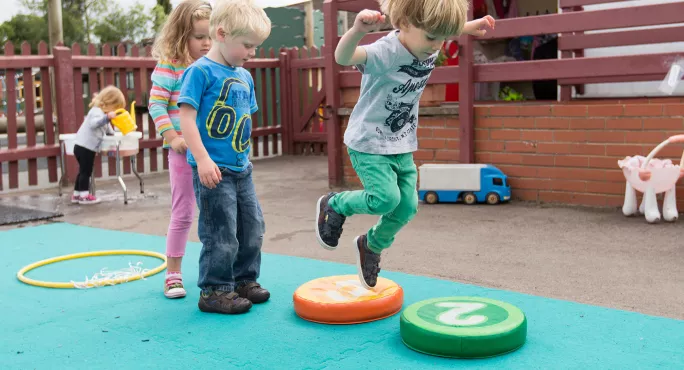- Home
- New early years goals revealed
New early years goals revealed

New goals setting out what four and five-year-olds are expected to be able to achieve in language and vocabulary by the end of Reception will be trialled from September across 25 schools.
The proposals are expected to ease the burden of the moderation process and enable teachers to "make a rounded judgement about a child’s development."
By reducing teachers' workload, it will "free up more time" for Reception staff to interact with pupils, according to children and families minister Nadhim Zahawi.
The proposals aim to create clear and specific early learning goals to boost speaking, communication and vocabulary to raise standards and tackle the "word gap" between disadvantaged children and their peers.
The government says the revised measures will help address the problem of those arriving at school struggling with language issues.
The proposals follow feedback from teachers who said they feel pressured to collect multiple pieces of evidence to justify their own observations of how a child is progressing.
Mr Zahawi said: “We want to improve education for every child and the early years in a child’s life are critical in laying strong foundations for future success. That is why we want to free up more time for Reception teachers to interact with their pupils, and make sure they are developing the rich vocabulary, skills and behaviours they need to thrive at school and in later life.
“The schools taking part in this pilot will help test these proposals, designed to cut down the burden of paperwork that exists with the current system. Teachers have the best understanding of their pupils, so it’s absolutely right that we empower them to use and trust their own professional judgment based on what they see.”
The pilots mark the first step of a full consultation process as part of the government's commitment to improve the Early Years Foundation Stage Profile (EYFSP).
The trials build on two schemes announced by education secretary Damian Hinds in April designed to boost children's early language and literacy skills at home before they start school
These include £5 million with the Education Endowment Foundation (EEF) to trial projects that offer parents practical tools and advice on learning new words with their children, and an £8.5 million programme open for councils to fund projects that help disadvantaged children’s language and literacy.
Clare Sealy, headteacher at St Matthias School, said the proposals will help teachers "focus on the most important factors in a child’s early education."
Ms Sealy, who sat on the working group, said: "It’s good to see self-regulation being included for the first time, as well as the strong emphasis on sharing stories with children. I’m also delighted that introducing children to wider knowledge of the world is part of these goals. Children find discovering this kind of learning so fascinating; they need this kind of powerful knowledge if they are to become creative critical thinkers.’’
Currently, there are 17 early learning goals, which range from being able to count to 20 to knowing some behaviour is unacceptable.
Children are assessed as either below, at or above each of these early learning goals by their teachers in the EYFSP.
The assessments are made through teachers' observations of children's play and learning throughout the year.
And the EYFS profile also includes comments on three "characteristics of effective learning", which are: playing and exploring, active learning and creating and thinking critically.
The government announced last year in its response to a review on primary assessment that the early learning goals would be revised to ensure a sufficient focus on increasing depth and breadth of vocabulary, ensure the "right building blocks for learning" in maths and literacy and include the latest research on self-regulation – children's ability to control their emotions.
It also said it would look at reducing the number of goals which are assessed although it recognised this was a "sensitive issue".
There has already been concern about how the review of the early learning goals is being carried out with almost 6,000 people signing a petition calling for the process to be suspended.
The announcement comes after a series of reports raising concerns about the gap between the early learning goals – particularly in maths – and the Year 1 curriculum, following changes to make the national curriculum, which begins in Year 1, more demanding.
These reports include the controversial Bold Beginnings report from Ofsted published late last year, which recommended a better alignment between early years education and key stage 1 and reported staff found the early years foundation stage profile burdensome.
But the report was condemned by early years teachers and academics who said it was a “potential disaster that play-based approaches" were undervalued.
James Bowen, director of NAHT Edge, said: "We welcome some of the changes to the Early Learning Goals, for example, the inclusion of self-regulation is a positive step. However, we do have reservations about some of the other changes that have been made and the potential impact of these.
"Critically, the government has made it clear that this is a genuine pilot. Feedback from schools and reception teachers must be taken on board during the trial process before any decisions are taken on a potential national roll-out.”
The pilot will be evaluated by the Education Endowment Foundation and Action for Children, and proposals will be refined ahead of a full public consultation based on feedback from the schools involved in the pilot and from experts and practitioners.
Keep reading for just £1 per month
You've reached your limit of free articles this month. Subscribe for £1 per month for three months and get:
- Unlimited access to all Tes magazine content
- Exclusive subscriber-only stories
- Award-winning email newsletters